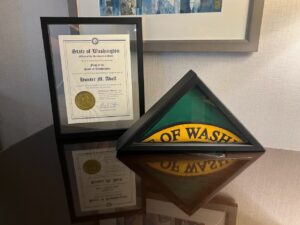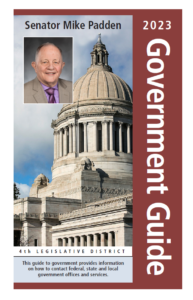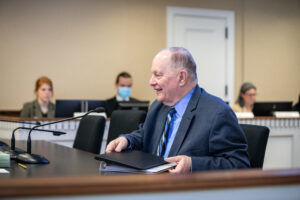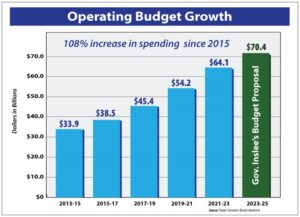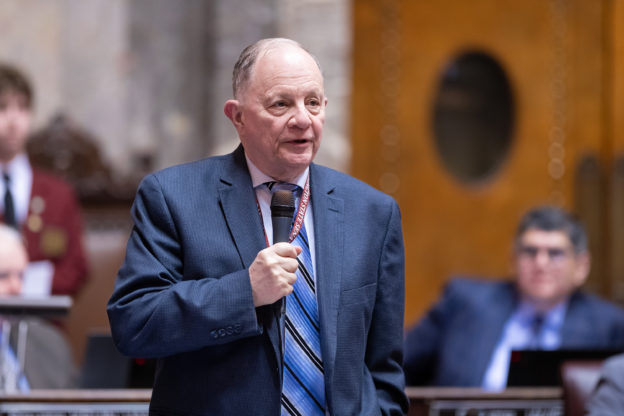Note: The following e-newsletter was sent to Sen. Padden’s subscribers January 8, 2024. To subscribe to Sen. Padden’s newsletter, click here.
Dear friends and neighbors,
This year’s legislative session begins today and is scheduled to last 60 days, ending March 7. Today will be highlighted with the traditional opening-day ceremonies in the Senate chamber. Tomorrow the Senate and House of Representatives will meet in a joint session in the House chamber to hear Governor Inslee’s final state of the state address.
Once these events are over, the Senate will focus much of its time on committee meetings. Each bill is referred to a committee, where it may receive a public hearing and possibly a vote – steps that are typically determined by the committee chair. The Senate will be in “committee mode” for most of the next month, though occasionally we will meet on the floor of the Senate chamber to debate and vote on bills sent forward by the committees. A solid run of these floor sessions will follow the initial round of committee work.
Veteran state government reporter Jim Camden wrote this column for the Spokesman-Review that explains how to keep tabs on the session. Jim’s column includes one of my favorite quotes: “No man’s life, liberty or property is safe when the Legislature is in session.”
The Inlander also ran a session preview story over the weekend.
The Legislative Building, where the Senate and House chambers are located.
Here are several resources to help you follow this year’s session
- My legislative website|Here you will find my news releases and clips, newsletters, bills, contact information, biography, and other information.
- The 4th District Government Guide| In this resource book, you will find the phone numbers, email addresses and offices of city, county, state and federal officials who represent you.
- The Capitol Buzz| A daily recap of the top online news stories. Click the link to subscribe.
- TVW| You may watch live broadcasts of floor and committee action online.
- Legislature’s website| Bill reports, committee agendas, and information about upcoming activities in the Legislature are here.
- State agencies| This website is where you may find all the state agencies, boards, and commissions.
- Washington Votes| The Washington Policy Center’s vote-tracking website.
To Track Legislation
- Go to leg.wa.gov
- On the left-hand panel, click “Bill Information.”
- If you know the bill number, enter it in the search field and click enter.
- Don’t have a bill number? Under the section “Standard Reports” you’ll find alternative tracking tools. You may search based on topic, within a specific biennium, and more.
If you have questions about how to participate in state government this year or thoughts to share on anything in this e-newsletter, please give me a call or send me an email.
Thank you, as always, for the honor of serving as your state senator!
Best Regards,
Senator Mike Padden
Meet Team Padden for 2024 session
I’m happy to introduce my legislative staff for this year’s session. My legislative assistant, Annalise Hemingway (right), joined the office last spring. My session aide this year is Ethan Mettlin (middle). Ethan has returned to my office for this year’s session after interning for me last year. Vandee Pannkuk (left) is my session intern this year. Vandee, an Onalaska native, attends Washington State University and is studying political science and criminal justice.
Reporters challenge Inslee over gas prices at legislative preview
In recent years it has seemed like many reporters, whether they are part of the Capitol Press Corps that cover state government or part of the Seattle media, have been hesitant to challenge Governor Inslee on issues when it’s apparent that he is wrong or misleading the public.
But in recent months, more members of the media have confronted the governor over how the state’s cap-and-trade program has led to higher gas prices in Washington over the past year. That willingness by the media to go after Inslee was on full display during this past Thursday’s legislative-session preview held on the Capitol campus.
After Inslee began his portion of the meeting by touting what he considers to be his accomplishments as governor entering what will be his last year in that office, some of the assembled media members took aim at him over a report published this week by the Washington Policy Center’s Todd Myers that showed Inslee knew long ago that a tax on carbon emissions would significantly increase gas prices.
The Myers piece noted that the governor’s chief policy advisor at the time told members of the Senate Energy, Environment and Telecommunications Committee in 2014 that a “High Carbon Price” scenario with a “CO2 price of $52 per metric ton (MT) – almost identical to the state’s current CO2 price – would increase gas prices by 44 cents per gallon.”
The publication of this report allowed reporters to ask Inslee about it Thursday. As you might guess, the governor was not inclined to agree with Myers’ assertion.
Brandi Kruse, a former reporter for Seattle’s KIRO radio and KCPQ-TV who now hosts the “Undivided” political podcast, asked Inslee pointed questions over gas prices that appeared to make the governor uncomfortable.
You may watch the governor’s interactions with reporters at the 3-hour, 4-minute mark of TVW’s coverage. It definitely is worth viewing.
The Center Square has an interesting article about Myers’ report and the defiant response by Inslee’s spokesman. KIRO Radio in Seattle published the transcript of a long and sometimes contentious interview with the governor last Friday in which KIRO reporters were not willing to let Inslee off the hook over higher gas prices.
Padden introduces bills to “ditch the switch,” tackle fentanyl crisis
Senator Padden asks a question during a committee meeting.
In the weeks leading up to this year’s legislative session, many lawmakers “prefiled” bills that will be formally introduced now that it’s opening day. Among the several bills I filed before today are proposals aiming to make our roads and highways safer, reduce fentanyl’s terrible impact in our state and finally end the twice-yearly switch between daylight saving time and standard time:
- Senate Bill 5791 calls for the Washington State Patrol to establish a pilot program to evaluate the outcomes and effectiveness of oral fluid roadside information used as part of the enforcement of impaired-driving laws. The measure is already scheduled for a public hearing tomorrow at 4 p.m. in the Senate Transportation Committee.
- Senate Bill 5795 would allow Washington to “ditch the switch” and keep the state on standard time year-round. If there is one issue most people agree on, it’s the dislike of moving their clocks from standard time to daylight saving time in the spring and then back to standard time in the fall. This bill would keep our state on standard time permanently. The proposal has not been sent to a committee yet, but it likely will go to the Senate State Government and Elections Committee.
- Senate Bill 5929 would make reckless endangerment with fentanyl a Class B Felony. Children are dying throughout our state as fentanyl use has increased dramatically. Late last month, information was released that fentanyl deaths in King County topped 1,050 last year, surpassing an all-time record. The bill is expected to be sent to the Senate Law and Justice Committee for consideration.
Two other proposals I’m introducing this session are:
- Senate Bill 5792 would expand on a new state law passed last session that makes it easier for small condominium buildings to be constructed. That new law, which I introduced, specifically exempts buildings with 12 or fewer units that are no more than two stories from the definition of a “multiunit” residential building. The 2024 bill would allow the construction of such condo buildings to include a third level for parking or retail stores.
- Senate Bill 6026 would protect the rights of parents and guardians by using students’ given names in public schools.
Contact us!
If you have a question or concern about state government, please do not hesitate to contact our office. During the session we are conducting business from our Senate office in Olympia. We are here to serve you!
Phone: (360) 786-7606
Olympia Office: 215 Legislative Modular Building, Olympia, WA 98504-0404
Email address: Mike.Padden@leg.wa.gov
PLEASE NOTE: Any email or documents you provide to this office may be subject to disclosure under RCW 42.56. If you would prefer to communicate by phone, please contact Sen. Padden’s Olympia office at (360) 786-7606.
To request public records from Sen. Padden, please contact Randi Stratton, the designated public records officer for the Secretary of the Senate and Senate members.





















